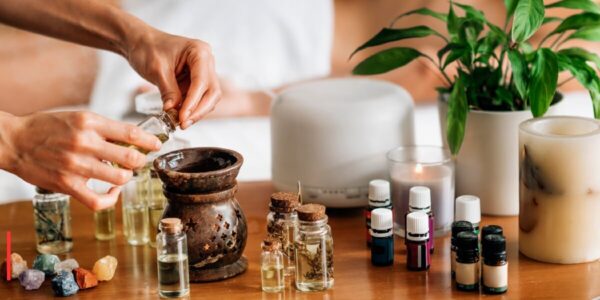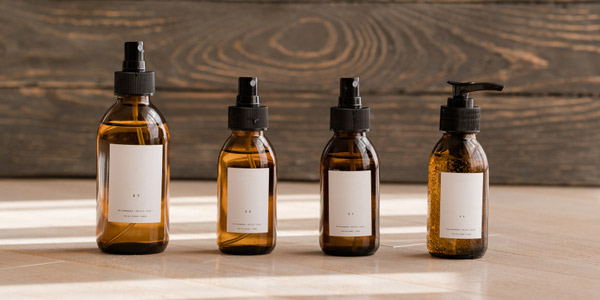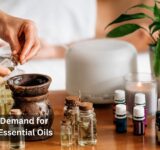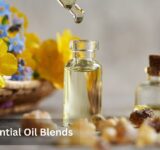- 16/05/2025
- Rohit Mishra
We all know the importance of essential oils. Experts predict that the essential oils market will reach USD 22 billion by 2030, growing at a CAGR of nearly 12%.

With this rise, private label essential oils firms that deliver premium products at competitive prices come into the market while offering insightful guidance on product development, regulatory adherence, and trend identification.
Essential Oil Market Trends Driving Demand
Essential oils market are gaining popularity due to growing consumer preference for natural and organic products in aromatherapy, wellness, skincare, haircare, and personal care industries.
Rising Consumer Preference For Natural And Organic Products
The global market is experiencing a surge in demand for private label essential oils due to consumers’ growing awareness of the health benefits of natural products and concerns about the ecological impact of chemical substances.
This trend has led to the popularity of organic essential oils in skincare, haircare, and wellness due to the adverse effects of chemical use.

Increased Use In Aromatherapy And Wellness Industries
Spas, alternative medicine, and meditation frequently utilize essential oils, recognized for their healing benefits, which can enhance mood and relieve disease symptoms.
They energize the limbic system, control emotions and memories, and engage the hypothalamus, releasing neurotransmitters such as serotonin, thereby making them useful for stress relief and mental health purposes.
Growth In Skincare, Haircare, And Personal Care Applications
Essential oils are essential for private label skincare, haircare, and personal care applications. They are crucial elements in serums, lotions, shampoos, and conditioners. In addition, they can help with anti-ageing, hydration, and scalp nourishment.
Why Private Labelling is a Smart Essential Oil Business Move
Private labelling is an effective sales strategy adopted by Essential Oil businesses that are growing in trend nowadays:
Cost-Effective & Time-Saving For Essential Oil Startups
Private labelling can be a cost-effective essential oil business model used by many firms to reduce product operational costs and time to market.
It benefits both the essential oil business and its clients by providing higher profit margins, reduced overhead costs, and the capacity to launch a essential oil brand using pre-made formulations swiftly.

Essential Oil Customisation And Brand Exclusivity
Private labels offer retailers the flexibility to customise essential oils product types, packaging, labelling, and custom formulation, allowing them to create unique offerings that represent their essential oil brand’s character and appeal to their target demographic.
Custom essential oils and fragrances, component combinations, and branding options are also made possible by this personalization, giving essential oil businesses a competitive edge.
Scalability And Flexibility In Essential Oil Offerings
Private labelling allows essential oil businesses to control the appearance and packaging of their products, as well as adapt them based on their specific needs.

Retail essential oil businesses can use private labels to source or produce products that showcase your logo and align with current essential oil market trends. Private branding enables firms to introduce seasonal or trend-based essential oil mixes.
Key Considerations When Choosing a Private Label Essential Oil Partner
Take into account aspects like packaging, industry compliance, ingredient sourcing, quality assurance, and branding support when selecting a private label essential oil partner.
Quality Assurance And Ingredient Sourcing
Partners in private labelling should make sure premium essential oils come from organic and pure sources. Third-party testing and certification are crucial for safety and security.
Private label companies can indirectly promote essential oil brands by mentioning them on packaging or marketing materials, as seen with Bo International’s numerous partners.

Compliance With Essential Oil Regulations And Standards
To successfully sell essential oils, it’s important to select a private label partner that follows industry rules, including those from the FDA, EU, and global safety laws in essential oil manufacturing.
GMP, or good manufacturing practices, establishes standards for essential oils production, testing, and control quality. This ensures that the right people, facilities, and materials are used in making the products.
Essential Oil Packaging And Branding Support
Packaging and branding support are essential for efficiently marketing your essential oils to buyers. Attractive packaging increases brand appeal.

The private label essential oil partners employ a variety of packaging and branding approaches, including the increasingly popular sustainable and eco-friendly packaging alternatives.
Conclusion
Because of their uses in aromatherapy, cosmetics, and holistic wellness, essential oils—which are derived from plants—have grown in popularity. They are essential for stress relief, immune system boost, and overall health. Bo International, an essential oil company, encourages entrepreneurs to invest in private label essential oils to ensure high-quality products are marketed.




